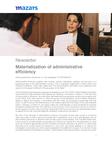
Materialization of administrative efficiency
Administrative efficiency, together with morality, celerity, impartiality, publicity, and economy, is a guiding principle of the administrative function. This is expressly established in Article 209 of the Political Constitution, which also states that "The administrative authorities must coordinate their actions for the proper fulfillment of the purposes of the State".
This constitutional principle was expressly developed by Law 1437 of 2011 (Administrative Procedure and Contentious Administrative Code (Cpaca) by indicating, in its article 3 -section 11- that "By virtue of the principle of efficiency, the authorities shall seek that the procedures achieve their purpose and, to this effect, they shall remove ex officio the purely formal obstacles, avoid inhibitory decisions, delays or delays and remedy, in accordance with this Code, the procedural irregularities that may arise, in order to ensure the effectiveness of the material right that is the object of the administrative action". Likewise, in Article 41, the Cpaca orders the materialization of said constitutional and legal principle by establishing that "The authority, at any time prior to the issuance of the act, ex officio or at the request of a party, shall correct the irregularities that have occurred in the administrative action to adjust it to the law, and shall adopt the necessary measures to conclude it".
By virtue of the principle of administrative efficiency, the public servant shall correct or correct ex officio any action so that it may be concluded with a substantive ruling on the right debated, and not with inhibitory decisions or decisions that consider purely formal aspects. This mandate implies that, in the course of an administrative proceeding, the official may request from the defendant, as many times as he deems appropriate, the documentation he deems necessary, to perform ex officio tests that allow to be certain about the existence or not of the right being debated or to redirect the investigation or procedure so that it may be adjusted to the petitioner's request. It is common to see that administrative proceedings culminate in administrative acts denying rights, because the public servant considers that the documentation provided was not sufficient to grant the right granted or because the petitioner did not indicate or provide some type of information that he considered necessary, even if it was not expressly stated in the law. This practice is colloquially known as "cajonazo" and implies that, as its name implies, the procedure is unjustifiably dismissed and filed in some drawer of the state entity. Although it is difficult to change this culture, the public servant should not forget that the raison d'être of his work is the prevalence of the rights of the administered, which should prevail.
The public servant who omits his obligation to previously sanitize the procedure may incur in a disciplinary offense that the law itself considers as "very serious" (article 31 Cpaca), since it implies the disregard of the rights of the administered party within the process. Likewise, it will result in the administrative act issued by the public servant being issued in contravention of the principle of due administrative process, which indicates (article 3, paragraph 1, Cpaca) that "administrative actions shall be carried out in accordance with the rules of procedure and competence established in the Constitution and the law, with full guarantee of the rights of representation, defense and contradiction".
The fact that the administrative act is adopted without complying with this mandate of prior reorganization, will make it susceptible to be attacked by the means of judicial control (action for annulment and reestablishment of the right) since such omission would imply the irregular issuance of the administrative act in violation of the law and entailing the disregard of the right of defense, since the same legislator has established that the prior reorganization of the process is consubstantial to the validity of the act itself. In addition, the act would be vitiated because a stage of the administrative procedure would have been pretermitted, which would inevitably vitiate the administrative act of nullity.


